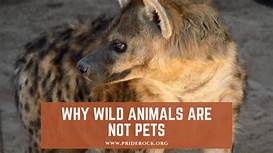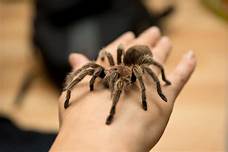Should Wild Animals Be Kept as Pets?
The keeping of wild animals as pets is a controversial issue, with strong arguments on both sides. On the one hand, some people believe that wild animals should be left in their natural habitats, where they can live freely and express their natural behaviors. On the other hand, some people argue that wild animals can make good pets if they are properly cared for and socialized.
Arguments against keeping wild animals as pets
There are several reasons why people argue against keeping wild animals as pets.
1. Risk of harm to humans and animals: Wild animals can be dangerous, and even if they are properly cared for, there is always the potential for them to injure or kill humans or other animals. For example, a wild animal may bite or scratch a human, or it may attack another pet in the household.
2. Inadequate living conditions: Most people are unable to provide wild animals with the living conditions that they need to thrive. Wild animals need large spaces to roam, as well as access to the appropriate food and climate. In captivity, wild animals may become stressed or depressed, and they may develop health problems.
3. Negative impact on wild populations: The keeping of wild animals as pets can have a negative impact on wild populations. When wild animals are taken from their natural habitats, it can disrupt the balance of the ecosystem. Additionally, the breeding of wild animals in captivity can lead to the introduction of new genes into wild populations, which can have unpredictable consequences.
Arguments for keeping wild animals as pets
Despite the arguments against keeping wild animals as pets, there are also some people who believe that it is possible to do so humanely and responsibly.
1. Educational value: Wild animals can be educational for both children and adults. They can teach us about the natural world and the importance of conservation. Additionally, wild animals can help to break down stereotypes and prejudices about animals.
2. Companionship: Some people argue that wild animals can make good companions. They can be affectionate and loyal, and they can provide their owners with a sense of purpose. However, it is important to remember that wild animals are not domesticated animals, and they may not always behave in the way that people expect.
3. Conservation: In some cases, keeping wild animals as pets can contribute to conservation efforts. For example, some people keep endangered species in captivity in order to help them breed and increase their population.
Conclusion
The decision of whether or not to keep a wild animal as a pet is a personal one. There are both pros and cons to consider, and it is important to weigh the risks and benefits carefully before making a decision. If you are considering keeping a wild animal as a pet, it is important to do your research and to make sure that you are able to provide the animal with the care and habitat that it needs.

Declaration: All article resources on this website, unless otherwise specified or labeled, are collected from online resources. If the content on this website infringes on the legitimate rights and interests of the original author, you can contact this website to delete it.




